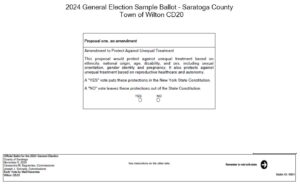
In early 2024, I was appointed and sworn in as Wilton Town Judge. With the 2024 election cycle upon us, it is now time for me to be elected to this position. While I am running unopposed, I am working hard to let my fellow town members get to know me, and to earn your vote this November. I promise to bring the same level of integrity, hard work and commitment to the Town Justice position that I have always brought within my professional and personal life. I will always be fair and impartial to all that are before me as a Justice of the Court.
From a young age, I knew that a career in law was my calling. I began working in a law firm as a paralegal at just 18, gaining invaluable experience in the legal field. After nearly a decade in that role, I decided to pursue my law degree, graduating with honors in 2006. I was admitted to the bar in January 2007 and became a partner at my firm just two years later. Throughout my career, I’ve dedicated myself to Family and Matrimonial Law as well as Civil Litigation, holding management and partner positions for the majority of my practice.
As a single father of three, all under the age of 18, I know firsthand the challenges life can bring. In 2019, I lost my children’s mother to a brief but aggressive battle with cancer. Navigating parenthood after such a devastating loss has given me deep empathy and a unique perspective on overcoming hardship. I’ve been fortunate to have a strong support network, but I understand how difficult it can be when life feels overwhelming.
I believe my compassion, fairness, and commitment to listening can make a positive impact on others during their most challenging times. As a judge, I want to offer that support, helping people find justice and hope when it may feel like their world is falling apart.
What motivated you to pursue a career as a town justice?
I have worked in the legal field for over 30 years, handling matters at all levels of local (Town, City, Village), State, and Federal Court. Being a judge was a natural progression in my career, but being Town Justice in Wilton, the community I live in and love, is a tremendous honor to me. Wilton is an amazing community to live in and watch my children grow and thrive in. Being a Town Justice here is just one way for me to give back to my community and its residents utilizing the education and experience in the law I have gained over the last 30 years.
Can you share your approach to ensuring fairness and impartiality in your courtroom?
Every person that comes before me in Court is entitled to, and deserves, to be treated with fairness and impartiality. As a Judge, you can never go into any case with any preconceived outcome, as every case is different. It is imperative for a Judge to listen to the facts of each case and apply the law to those facts fairly. That is exactly how I approach every case.
What unique experiences or qualifications do you bring to the position that set you apart from other candidates?
I bring over 30 years of legal experience and education to this position. I have handled thousands of cases over the years, which included conducting countless depositions and trials. I am no stranger to the courtroom as my entire legal career was in litigation. Outside of my legal experience, I am a full-time single parent household. I have three children who are the world to me. I have lived through many life experiences that have shaped who I am as a person and has given me keen insight on the level of compassion and understanding a person should have for everyone they encounter as everyone has challenges and experiences in their lives that may very well factor into why they are before me in Court. I make it a point to listen to that when dealing with any case.
How do you handle cases that involve conflicts between state laws and local ordinances?
This is a tough question to answer with a quick response, but the best I can say is that where a conflict between State law and local ordinances exists, one must first look to the State law to see if it supersedes or preempts any local ordinance. If so, then the State law is to be applied. If it does not, then often times it requires the ability to understand the interplay between the two laws and either applying one over the other, depending on the facts of the case before you, or perhaps applying both the State law and the local ordinance where that can occur.
What role do you believe the town justice plays in maintaining community trust in the legal system?
The Town Court is often a place that most people in a community who have an experience with the Court system will find themselves, i.e. a traffic ticket, small claims matter, eviction, etc. People therefore should expect that they will be treated with respect and fairness and given the chance to be heard during that process. It is incumbent upon the Town Justice to do just that, which in turn will instill trust in the legal system with the community.
How do you view the importance of alternative sentencing, such as community service or rehabilitation, in dealing with low-level offenses?
I think community service or rehabilitation are a vital part of our judicial system. Community service allows the individual doing that service within their community to understand more the impact of their actions on the community, as well as hopefully gain a better respect and pride for community by doing that service. Rehabilitation is always an important resource in any case where it is clear that some type of rehabilitative service could help in preventing future crimes or infractions for that individual.
In what ways do you ensure that defendants who cannot afford legal representation are treated fairly in your courtroom?
I make sure from the first appearance with a defendant that they are aware of their right to counsel, whether that be assigned counsel, if qualified or entitled, or retained counsel of their choosing. I make sure that they complete a public defender application if they are requesting assigned counsel, and the Court will coordinate sending that application to the Public Defender’s office to avoid any delay in the process. Additionally, if on the first appearance the defendant does not have counsel present, I will schedule the matter for a future appearance and make sure that assigned counsel will be present at that appearance to assist the defendant in their matter.
How do you balance the need for public safety with the rights of the accused in your decision-making?
Again, every defendant is entitled to be treated fairly and impartially when appearing before the Court, and that is exactly how I approach every case. As part of the process of handling any case though, public safety is also a consideration for any Court in a case as there has to be a balance of public safety with the rights of individuals being charged with a crime or infraction. Because this is a very fact specific determination, it is difficult to give a more specific response to this question.
Election Day: Tuesday, November 5, 2024
NYS Board of Elections: https://elections.ny.gov/
Poll Site Lookup: https://voterlookup.elections.ny.gov/
To use this feature, you must already be registered to vote in New York State
Register to Vote: https://elections.ny.gov/register-vote
Deadlines: Mail in registrations must be received by a board of elections no later than October 26, 2024. You may register at your local board of elections or any state agency participating in the National Voter Registration Act, on any business day throughout the year but, to be eligible to vote in the General Election, your application must be received no later than October 26, 2024.
Vote by Mail Ballots: https://elections.ny.gov/request-ballot
Deadlines: For the November 2024 General Election:
- Put it in the mail ensuring it receives a postmark no later than November 5th. Must be received by the County Board of Elections no later than November 12th.
- Bringing it to your County Board of Elections Office no later than November 5th by 9pm.
- Bringing it to an early voting poll site in your county between October 26th and November 3rd.
- Bringing it to a poll site in your county on November 5th by 9pm.
When mailing your completed ballot, the USPS recommends that voters allow enough time for ballots to be returned to the Board, which is generally seven days ahead of the general election.
Voters who mail in their ballots on Election Day must be aware of the posted collection times on collection boxes and at the Postal Service’s retail facilities, and that ballots entered after the last posted collection time will not be postmarked until the following business day.
Accessible Ballots: https://ballotapplication.elections.ny.gov/home/accessible
Voters with a print disability, which means any disability that interferes with the effective reading, writing, or use of printed material, and require a ballot with accessible features may apply using the online Accessible Ballot Application Portal.
Print disabilities include blindness, low vision, dyslexia, dysgraphia, learning disabilities, and physical disabilities that limit writing abilities.
Voters using the accessible ballot system in need of printing services in order to print their ballot can access such services at certain public printing resources, including but not limited to, libraries, print stores, shipping stores, and office supply stores. Voters should contact their local printing resources for details on the printing services offered.
In-person voting using an accessible Ballot Marking Device (“BMD”) during early voting or on Election Day is still available to voters with a disability who do not want to vote using the accessible ballot system.
New Ballot Procedure
Due to a recent change in law, New York State voters are no longer permitted to cast a ballot on a voting machine if they have already been issued an early mail, accessible, or absentee ballot for that election. Voters who have already been issued a ballot can still vote in person using an affidavit ballot. The affidavit ballot will be kept separate until the election is completed. Election officials will verify whether the voter’s early mail, accessible, or absentee ballot has been received. If the voter’s ballot has been received, the affidavit ballot will not be counted. If the voter’s ballot has not been received, the affidavit ballot will be counted.
If a voter requests a second early mail, accessible, or absentee ballot, any previously issued ballot that is returned by the voter will be set aside unopened to provide the voter a chance to return the second ballot, unless the first ballot has already been opened. If both ballots are received before the return deadline, the ballot with the later postmark date is accepted and any other ballots that have been received are rejected, unless the first ballot has already been opened. If a voter submits more than one timely ballot and cast an affidavit ballot, the last received ballot, either submitted in person during the election or by mail within the absentee return deadline, will be canvassed.


New Tab
